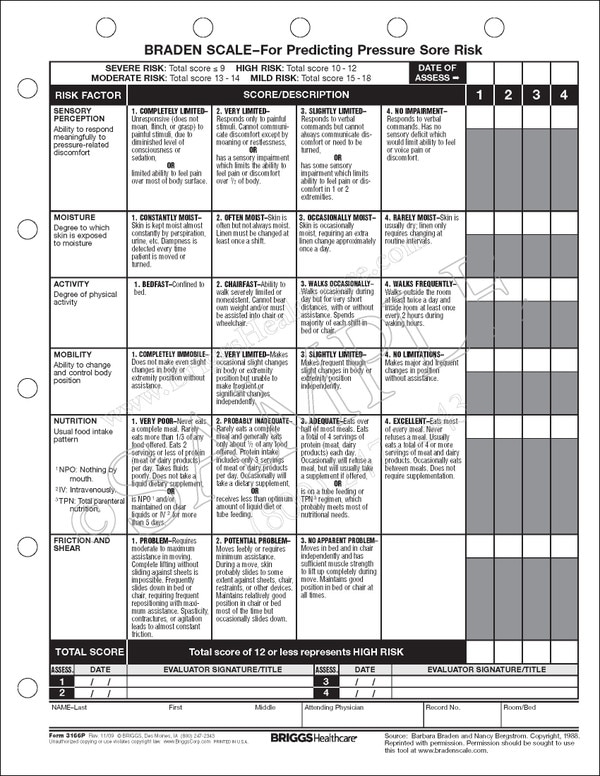- Printable Braden Scale Chart
- Printable Braden Scale Assessment Form
- Printable Braden Scale
- Free Printable Braden Scale



Poor nutrition, intravascular volume depletion, and peripheral vascular disease can each lead to unhealthy skin and impaired wound healing, which in turn increases the risk of developing pressure ulcers. Low body weight is also a concern. Weight less than 119 pounds or a body mass index (BMI) less than 20 indicates increased risk for pressure ulcer development [80].
The Braden score calculator helps you identify patients at risk of pressure ulcers. Learn to calculate Braden scale scores quickly on the web's most interactive Braden learning tool.
Recent weight loss, decreased nutritional intake, inadequate dietary protein, and impaired ability to feed oneself have been identified as risk factors for pressure ulcer development. An estimated 50% of elderly patients admitted to hospitals have suboptimal protein nutrition [80]. When there is a sustained deficit of protein as an energy source, skin and soft tissues become more vulnerable to injury. In managing patients with pressure ulcer, or those at risk, the amount of protein in the diet appears to influence prognosis for recovery and prevention. In one study, patients who received a 24% increase in protein intake had significant improvements in ulcer healing and prevention of new skin injury compared to those who received a 14% increase [24].
Printable Braden Scale Chart
Poor nutrition, intravascular volume depletion, and peripheral vascular disease can each lead to unhealthy skin and impaired wound healing, which in turn increases the risk of developing pressure ulcers. Low body weight is also a concern. Weight less than 119 pounds or a body mass index (BMI) less than 20 indicates increased risk for pressure ulcer development [80].
Printable Braden Scale Assessment Form
BRADEN SCALE – For Predicting Pressure Sore Risk Use the form only for the approved purpose. Any use of the form in publications (other than internal policy manuals and training material) or for profit-making ventures requires additional permission and/or negotiation.
Printable Braden Scale

Free Printable Braden Scale
Recent weight loss, decreased nutritional intake, inadequate dietary protein, and impaired ability to feed oneself have been identified as risk factors for pressure ulcer development. An estimated 50% of elderly patients admitted to hospitals have suboptimal protein nutrition [80]. When there is a sustained deficit of protein as an energy source, skin and soft tissues become more vulnerable to injury. In managing patients with pressure ulcer, or those at risk, the amount of protein in the diet appears to influence prognosis for recovery and prevention. In one study, patients who received a 24% increase in protein intake had significant improvements in ulcer healing and prevention of new skin injury compared to those who received a 14% increase [24].